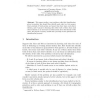Free Online Productivity Tools
i2Speak
i2Symbol
i2OCR
iTex2Img
iWeb2Print
iWeb2Shot
i2Type
iPdf2Split
iPdf2Merge
i2Bopomofo
i2Arabic
i2Style
i2Image
i2PDF
iLatex2Rtf
Sci2ools
CTRSA
2006
Springer
2006
Springer
Fair Identification
This paper studies a new problem called fair identification: given two parties, how should they identify each other in a fair manner. More precisely, if both parties are honest then they learn each other's identity, and if anyone is cheating then either both of them learn each other's identity or no one learns no information about the identity of the other. We propose a security model and a provably secure optimistic fair identification protocol.
Related Content
| Added | 22 Aug 2010 |
| Updated | 22 Aug 2010 |
| Type | Conference |
| Year | 2006 |
| Where | CTRSA |
| Authors | Omkant Pandey, Julien Cathalo, Jean-Jacques Quisquater |
Comments (0)

